Whether you’re on an afternoon trek or a multi-day hike, having energy-dense snacks available is important. Nutrient-rich foods like meat, nuts and fruit will help replenish your energy levels, but filling options like oats and instant noodles are useful too.
We’ve tested some of the best hiking foods available to help you fuel up whilst enjoying the great outdoors.
What to look for
To find the best hiking food, consider:
- Nutritional value (anything with high protein, complex carbs and healthy fat)
- Taste
- How easy it is to prepare and eat (while walking in different weather conditions)
- Whether you’ll need a kettle or camping stove
- How well it keeps (for multi-day hikes)
- Size and compactness
- Packaging (is it biodegradable or recyclable?)
- Weight (dehydrated food can be lightweight and filling)
- Price
How much food do I need to take on a hike?
As a rough guide, you should eat around 200-400 calories per hour, or around 3,000 calories per day. If you’re hiking to a specific destination like a mountain summit or the coast, you could save your food for a picnic, but it’ll take longer to digest than regular snacks.
To be more specific, consider:
- The length of the trek
- How demanding it is (are there lots of inclines or uneven terrain?)
- The type of walk (are you reaching a specific destination or doing a continuous walk?)
- The weight of your pack
For multi-day treks, you’ll need to eat more calories per day as the hike goes on because you’ll be using up any fat reserves you’ve developed in your body.
Best hiking food for 2025 - tested by experts
Nature's Heart mixes
Best for a nutritious and easy-to-eat snack
SQUIRREL_TEXT_13111599
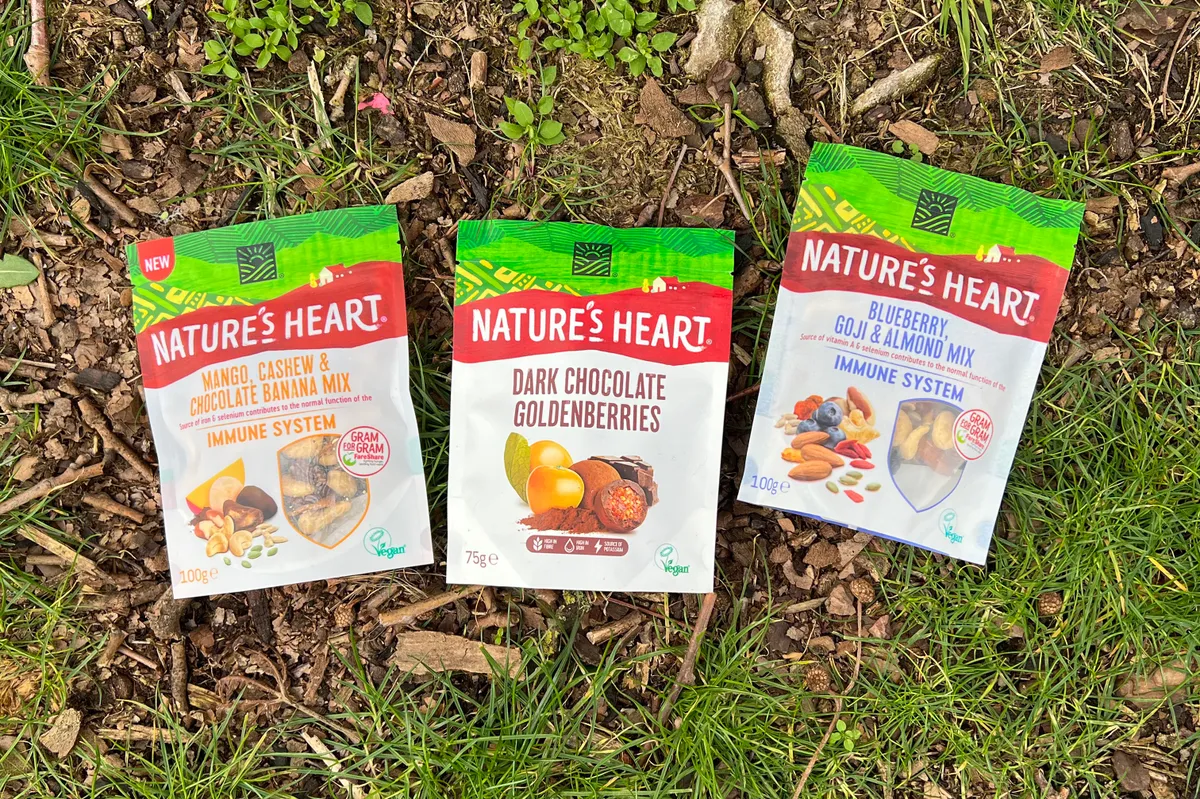
- 100g bags
- Vegan, gluten-free
- Different mixes available
Pros: easy to eat, great for sharing, tasty, resealable pouch
Cons: may not be as tasty as other snacks
Scroggin, or trail mix – usually a blend of nuts and dried fruit – is a great snack to take hiking. Not only will it give you a boost of natural sugars when your energy levels dip, but it’s often tasty and great for sharing. Plus, you can customise them by adding your favourite treats like M&Ms.
Nature’s Heart is one of my go-to brands for trail mix. It sells various blends of nuts, seeds, fruits and chocolate, so you can find your favourites. The company also supports the food poverty organisation FairShare.
Nutritious, convenient and extremely more-ish.
As these are nutritious trail mixes, there are no salted nuts here. They could taste bitter if you’re not used to eating them plain, but we enjoyed them alongside the dried and chocolate-coated fruits for a hit of sweetness. The sweet goji berries and zingy goldenberries were particular favourites. Some packs include chewy dried mango chunks for texture.
The smaller seeds migrate to the bottom of the pouches and can be a faff to eat with your hands, but they’d be great sprinkled over porridge or other meals if you’re camping.
In short, these are nutritious, convenient and extremely more-ish – a winner for hikers and campers.
SQUIRREL_13111599
KIND bars
Best for a hit of fat and fibre
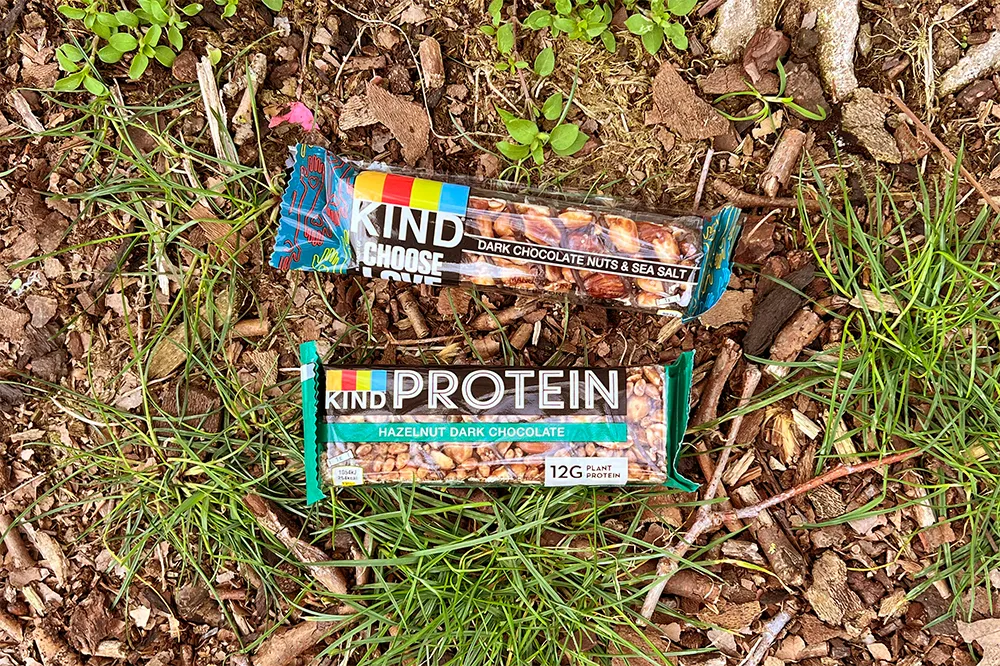
- High fibre, gluten-free
- 60% nuts
- High protein range with 12g plant protein per bar
- Thins range, just 19g per bar
Pros: tasty, compact, contains whole nuts for protein
Cons: quite sharp texture
Nutty bars like these are a convenient option if you want to get a quick boost of energy without turning to trail mixes. These ones are particularly good as they contain whole nuts – although these can make the bars slightly sharp in texture when you are eating.
The 40g chocolate and sea salt bars we tested contained 6.6g protein, 5.4g fibre and 7g sugar, while the 50g high-protein bars included 12g plant protein, without boosting fibre and sugar to more than 5.5g fibre and 8g respectively. There are no artificial colours, flavours or preservatives here.
Both bars were tasty, although not as sweet as others you can buy, so they’re good for hikers who don’t like sickly snacks. Some testers marked the standard bar down for its big salt chunks.
In comparison, the hazelnut and dark chocolate protein bars are slightly more mild in flavour, with a Rice Krispies-like texture. Impressively, they don’t have the malty taste you find in lots of protein products, and don't sit on your stomach during post-snack exercising.
Looking for other nutritious snack bars? Nakd Fruit & Nut Bars are another great choice. The brand cold-presses raw, natural ingredients to create delicious, chewy bars.
HIGH5 Zero Electrolyte Tablets
Best for replenishing electrolytes
SQUIRREL_TEXT_13076253
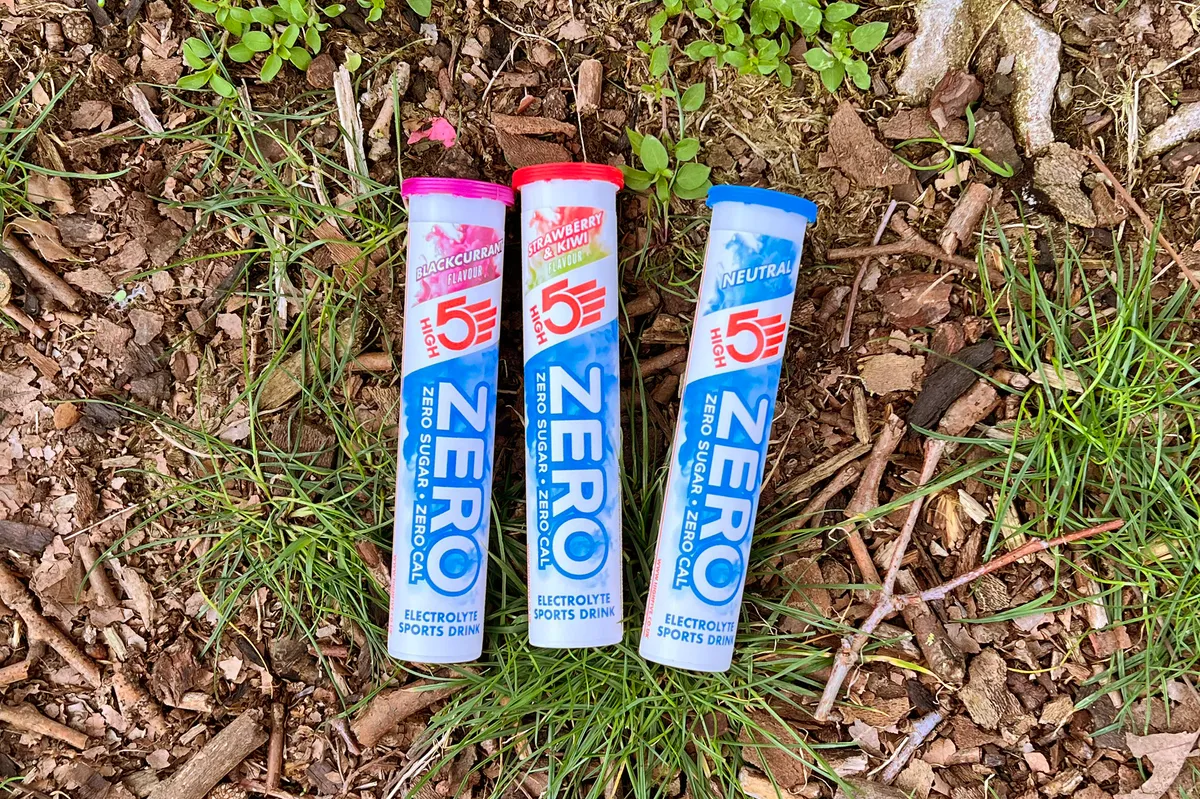
- 20 tablets per tube
- 80g per tube
- Add 750ml water
Pros: should replenish electrolytes, lots of flavours
Cons: may need to transfer to a more compact container if you only need a few, divisive taste
OK, electrolyte tablets technically aren’t a food… but they are useful for topping up your hydration and energy levels during demanding hikes. On hot days, they’ll replace electrolytes lost when you sweat. Add one to 750ml of water to create a flavoursome drink.
These ones from High5 are a cost-effective option and produced mixed opinions across the testing team. Those who had used electrolyte tablets in the past or loved fizzy drinks were happy with them, while others found the taste and fizziness slightly off-putting. The fruity versions like the Strawberry and Kiwi proved the most popular, while the neutral tasted slightly acidic and citrusy.
The flavours in general were fairly mild, but this could be to allow for hikers who drink two tablets at a time.
To find the best brand for you, it might be worth reading an extensive review like 220 Triathlon’s Best Electrolyte Drink Tablets.
SQUIRREL_13076253
Real Turmat dehydrated meals
Best for an easy meal
Buy from Amazon (£9.95)
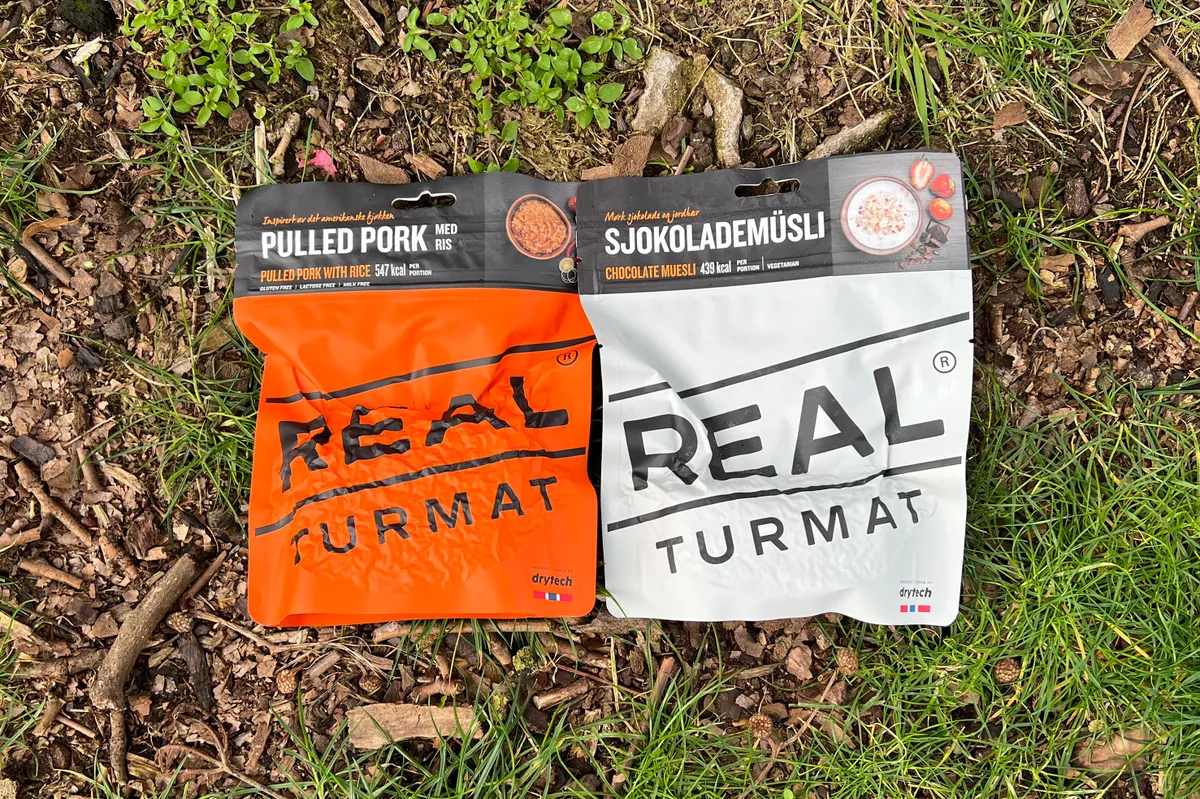
- Dehydrated food
- 71-203g per pouch
- 246-706 kcal per pouch
- 3-7 year shelf life
Pros: warm, tasty, a full meal in a compact pouch
Cons: need access to boiling water, takes a few minutes to prepare
Real Turmat was our favourite brand when we tested a range of different camping food meals. Although these dehydrated food pouches are on the pricier end of the spectrum, with some coming in at £12.99, they were the tastiest we tried. We’d recommend them as a lunch option on particularly long or arduous hikes if you need more than a quick snack.
As the meals are freeze-dried, the pouches are under 203g each so they won’t add much weight to your pack – although you will need a stove to boil water. You can then eat the food straight from the pouch, so you don't need separate bowls and plates.
A great option if you’re willing to spend a little more on a filling and tasty meal.
During our taste test, we tried the hot-chocolate ‘Sjokolademüsli’ muesli and the pulled-pork meal. We found you can’t really go wrong with a porridge-style camping meal, and we loved the melty chocolate chips in Real Turmat’s version. In short, it was comforting, filling and delicious.
While dehydrated food can be hit and miss, Real Turmat’s pulled pork looked and tasted just like a regular home-cooked meal. It had a rich, tomatoey flavour with a strong oregano taste, and the well-cooked rice gave it great texture. All in all, a comforting treat.
SQUIRREL_13076245
Ember biltong
Best for a hit of protein
SQUIRREL_TEXT_13076257
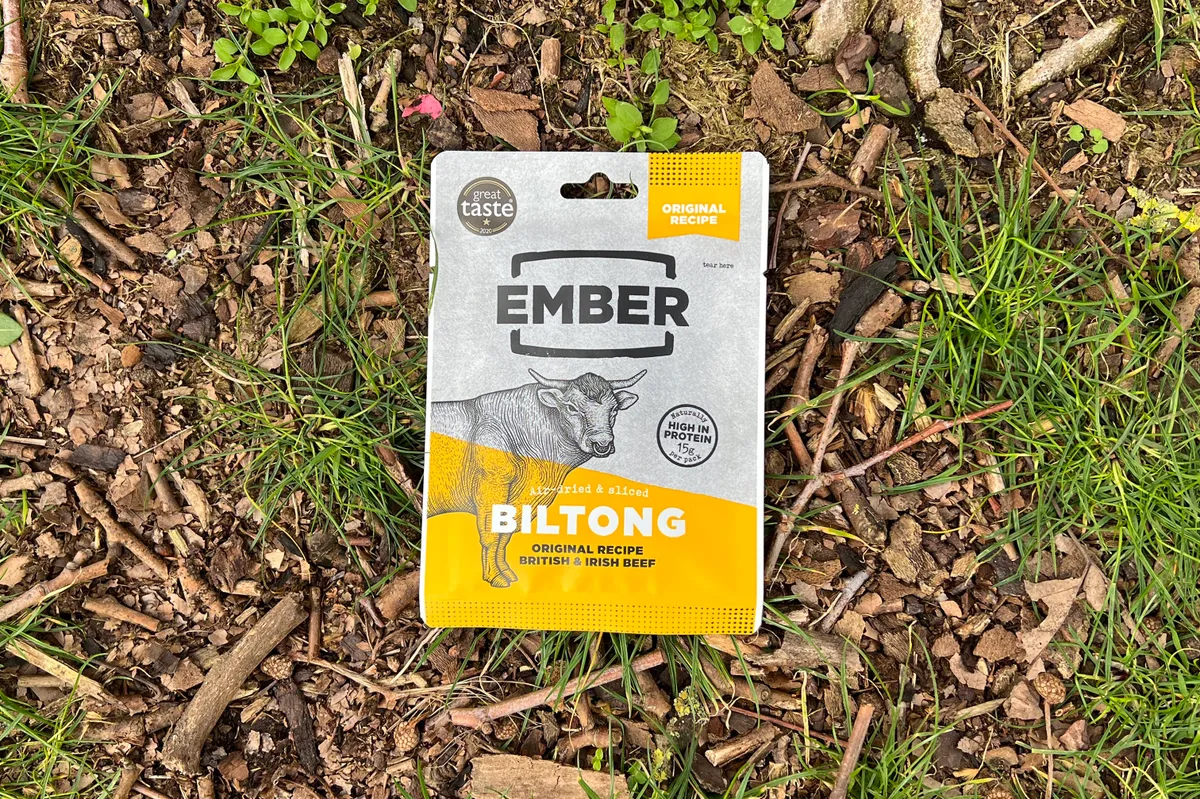
- 28g per pouch
- Under 1g sugar and over 14g protein per pouch
- 220g beef used for every 100g biltong
Pros: protein-rich for slow-burn energy, tasty, lightweight, compact packing
Cons: some people may dislike the taste/texture, not suitable for veggies and vegans
For a tasty, protein-rich snack, some hikers swear by biltong: thinly sliced, dried, cured meat. Although it won’t be right for veggies and vegans, it could be a great calorie-dense option for meat-eaters in need of a filling snack and some slow-release energy.
For this test, we tried Ember’s 28g packs of biltong. This brand uses lean British and Irish beef, flavoured with coriander, garlic and pepper. Thanks to the saltiness and added ingredients, it’s extremely tasty compared to a lot of other dried foods. In fact, it has a stronger taste than some other biltong brands.
On the downside, the chewy meat strips do tend to get stuck in your teeth, but they’re a more-ish snack in a convenient grab-bag for hiking. If you’re cooking full meals on your trek, why not sprinkle the biltong over the top for a protein boost?
SQUIRREL_13076257
How we tested
- We selected test products across various categories based on product reviews
- We compared their price, weight, size and nutritional value
- We tasted them to see how easy and pleasant they were to eat
Other great hiking foods to consider
We also recommend these great hiking foods:
Babybel cheese
Cheese makes a convenient hiking snack; high in protein and calcium, and easy to nibble as you walk along. Babybels are a particularly handy option as they come with a layer of wax to keep them clean and fresh without the need for sandwich boxes or clingfilm. Keep a few in your pack or coat pockets for a quick snack.
- Buy Babybel Original from Tesco (£2.59)
- Buy Babybel Vegan from Ocado (£2.15)
Soreen Malt Lunchbox Loaves
According to the makers, Soreen’s fruity malt loaves contain 50% less sugar than the average cake slice, so they’re a great alternative to a nut or granola bar. They’re also individually wrapped and vegan-friendly, which makes them an easy option for group hikers.
SQUIRREL_TEXT_13111605
Wholefood salads
If you’ve got room in your pack for a food box, you could buy a salad from your local supermarket or farm shop. The best ones include extras like brown rice, nuts and seeds for complex carbs. Eat while fresh!
- Buy M&S's Super Nutty Wholefood Salad from Ocado (£2.90)
Nuts and seeds
For healthy fats and a big hit of protein and energy, take some nuts or seeds with you. Choose your favourite type or opt for a salted blend to replace lost salts in hot weather. Buying in large quantities of 1kg or so is much better value; and seeds such as sunflower and pumpkin seeds are usually cheaper than nuts but deliver a similar boost.
Salami and pork pies
When you are on a hard day's hike, products like salami and pork pies packed with protein and fat to keep you going. They’re useful for delivering slow-burn energy and helping avoid the sugar crash you’d get with sweet alternatives.
Chocolate
Chocolate can be a great little pick-me-up when your sugar levels dip. Just make sure you don’t overdo it or your energy will see-saw throughout the day.
SQUIRREL_TEXT_13103175
Dates
Full of natural sugars, dates make a nutritious alternative to chocolate for boosting energy levels. Similarly, just don’t guzzle too many at once – the sugars may be natural, but eating too many can cause the same see-saw effect on your energy levels. Like nuts, dates bought in larger quantities are much better value – look for 500g or 1kg packs. Even if you only eat a few on each walk, they will keep fresh in your kitchen cupboard for months.
SQUIRREL_TEXT_13111606
Flapjack
An all-time favourite for hikers, flapjack is just as delicious as it is nutritious, with oats for complex carbs and honey or syrup for an instant energy boost. This snack should also be a popular choice if you’re walking with little ones. Oats contain protein, but protein-enriched oat-based bars add an extra dose of sustaining slow-release energy.
- Buy high-protein flapjacks from Bulk (£2.49), Grenade (£17.95)
Apples
Stay fresh in warm weather, and a great option to freshen the palate after eating other foods.
Bananas
Another convenient, cheap and easy-to-eat snack hat delivers a quick burst of energy, combined with some complex carbs for slow energy burn. If you’re guilty of forgetting to store your fruits near the top of your pack, you may want to buy an affordable banana protector to avoid bruising.
SQUIRREL_TEXT_13111607
Freeze-dried fruits
If weight is important to you, swap fresh fruit for freeze-dried. It’s incredibly lightweight but still has most of the vitamins, minerals and fibre you’d get from the original fruit. Plus, it packs a punch when it comes to flavour so it's tasty to eat on its own or sprinkled over porridge and muesli.
Sandwiches
Whether you buy your sandwiches en-route or make them at home, be sure to choose brown bread. Your body will process the wholemeal flour slowly and release energy consistently over a period of time. White bread is like rocket fuel – the energy it provides burns brightly but briefly, and leaves you craving more.
Peanut butter sandwiches will stay fresh for more than a day and deliver a big protein and energy hit, so it’s a win-win if you’re making your sandwiches at home.
Wraps
A convenient alternative to sandwiches. They’re lightweight and stay fresh, and they won’t get squashed as easily as bread will.
Hot food (dehydrated and boil-in-the-bag meals)
If you’re happy to carry a small stove with you, you’ll be able to cook up a whole range of camping meals in under 10 minutes. Hot food lifts the spirits and warms you up, which is especially valuable on cold, wet days. Plus, dehydrated options are light and compact.
Looking for full meals? We’ve tested and rated a range of dehydrated and boil-in-the-bag meals in our guide to the best camping food you can buy.





